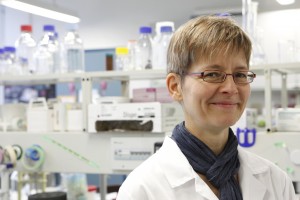Environmental Science: Nano welcomes three more members to its board. Find out who they are and a bit about their research below…
Professor Kristin Schirmer
Kristin joins us as a third Associate Editor, working in conjunction with Jim and Greg, to handle and process our incoming submissions.
Professor Kristin Schirmer is presently the Head of the Department of Environmental Toxicology at the Swiss Federal Institute of Aquatic Science and Technology, Eawag, Switzerland. She studied for her Ph.D. in Canada, at the University of Waterloo.
Kristin has vast experience within biological environmental research; in 2007 she received three separate awards for her achievements: the SETAC Environmental Education Award, the Felix-Wankel Animal Welfare Research Award and the Helmholtz Centre for Environmental Research (UFZ) Stimulus Award for Technology Transfer for the Ceramic Toximeter passive sampler.
Kristin’s primary research interest is in environmental toxicology and animal cell biology. She has a particular interest in how environmental contaminants, including engineered nanoparticles, interact with aquatic organisms. Kristin is working towards linking changes on the molecular level to whole organism and population level effects and the advancement of in vitro approaches to enable resource-efficient environmental monitoring and a reduction in the use of animals in toxicology.
Dr Frank von der Kammer
Frank joins the editorial board as a representative from the University of Vienna, where he is currently Head of the Nanogeosciences Division and vice Head of the Department for Environmental Geosciences. Frank completed his PhD with highest honour at Hamburg University of Technology and has since acted as a visiting Professor at the University of Pau and at the University of Aix-Marseille.
Frank’s research interests include environmental colloids, their dynamic behaviour and interaction with trace elements, natural nano-scale processes, nanoparticle characterization, engineered nanoparticles in the environment and the application of field flow fractionation to characterize nanoparticles in complex samples. He has published more than 50 peer-reviewed papers within both nano research and nanoparticle characterization.
Professor Robert Hamers
Bob joins the Nano editorial board alongside Frank. Currently, Robert is a Professor in the Department of Chemistry at the University of Wisconsin-Madison, a Department which he Chaired between 2007-2010. This year Robert contributed to the Frontiers in Chemical Research Distinguished Lecturer Series, Texas A&M University, and in 2012 won an American Chemical Society National Award in colloid and surface chemistry.
Robert’s research interests predominantly focus on environmental health and safety of nanomaterials. His research investigates the environmental impact and potentials safety issues associated with release of nanomaterials in the environment and his team are engaged in research projects aimed at understanding how the size, shape, and surface functional groups impact the bioavailability and toxicity of nanomaterials. He is particularly interested in the biochemical effects of nanoparticles, addressing questions such as “how do nanoparticles impact protein folding processes?” and “do nanoparticles induce genetic mutations or other trans-generational effects?”.













